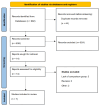Clinical Outcomes in Blood Culture-Positive Versus Blood Culture-Negative Infective Endocarditis: A Systematic Review and Meta-Analysis
- PMID: 40821345
- PMCID: PMC12357163
- DOI: 10.7759/cureus.88134
Clinical Outcomes in Blood Culture-Positive Versus Blood Culture-Negative Infective Endocarditis: A Systematic Review and Meta-Analysis
Abstract
Infective endocarditis (IE) cases where blood cultures fail to identify causative organisms, known as blood culture-negative endocarditis (BCNE), represent a significant portion of all endocarditis diagnoses. This absence of microbiological identification creates therapeutic challenges, as clinicians cannot tailor antimicrobial therapy to specific pathogens. The relationship between microbiological culture results and patient prognosis continues to be an area requiring further investigation. This systematic review and meta-analysis compared clinical outcomes between blood culture-positive endocarditis (BCPE) and BCNE patients. We conducted a comprehensive search of PubMed/MEDLINE, Embase, Scopus, Web of Science, and Cochrane Library from inception to May 2025. Observational studies comparing outcomes between BCPE and BCNE in adult patients were included. Primary outcomes were mortality, embolic events, and need for surgery. Risk ratios (RRs) with 95% confidence intervals (CIs) were calculated using random-effects models. Seven studies encompassing 5,349 participants were included, with a pooled BCNE prevalence of 16.8%. No significant difference was found in mortality between BCPE and BCNE groups (RR: 0.98, 95% CI: 0.76-1.25). However, BCPE patients had a significantly higher risk of embolic events compared to BCNE patients (RR: 1.38, 95% CI: 1.16-1.63). No significant difference was observed in surgical intervention rates (RR: 0.98, 95% CI: 0.75-1.27). Secondary analysis revealed that BCPE patients had higher rates of fever and abscess formation but a lower incidence of heart failure compared to BCNE patients. While mortality and surgical outcomes were similar between groups, blood culture-positive IE patients demonstrated significantly higher embolic complications. These findings suggest that culture-positive status may serve as a marker for increased embolic risk, warranting enhanced monitoring and early intervention strategies in clinical practice.
Keywords: blood culture-negative; clinical outcomes; embolic events; infective endocarditis; meta-analysis.
Copyright © 2025, Rehman et al.
Conflict of interest statement
Conflicts of interest: In compliance with the ICMJE uniform disclosure form, all authors declare the following: Payment/services info: All authors have declared that no financial support was received from any organization for the submitted work. Financial relationships: All authors have declared that they have no financial relationships at present or within the previous three years with any organizations that might have an interest in the submitted work. Other relationships: All authors have declared that there are no other relationships or activities that could appear to have influenced the submitted work.
Figures




References
Publication types
LinkOut - more resources
Full Text Sources
